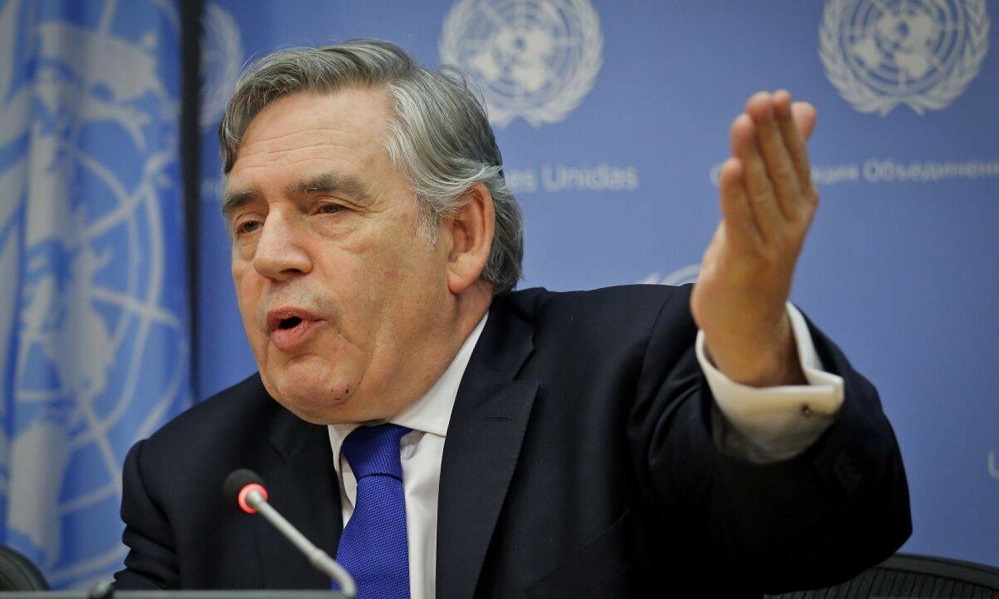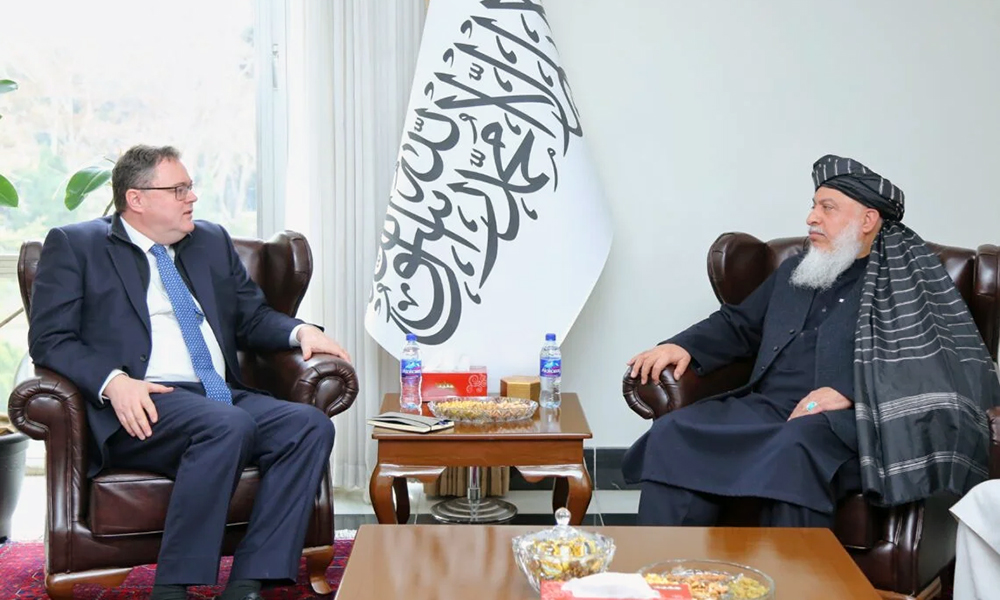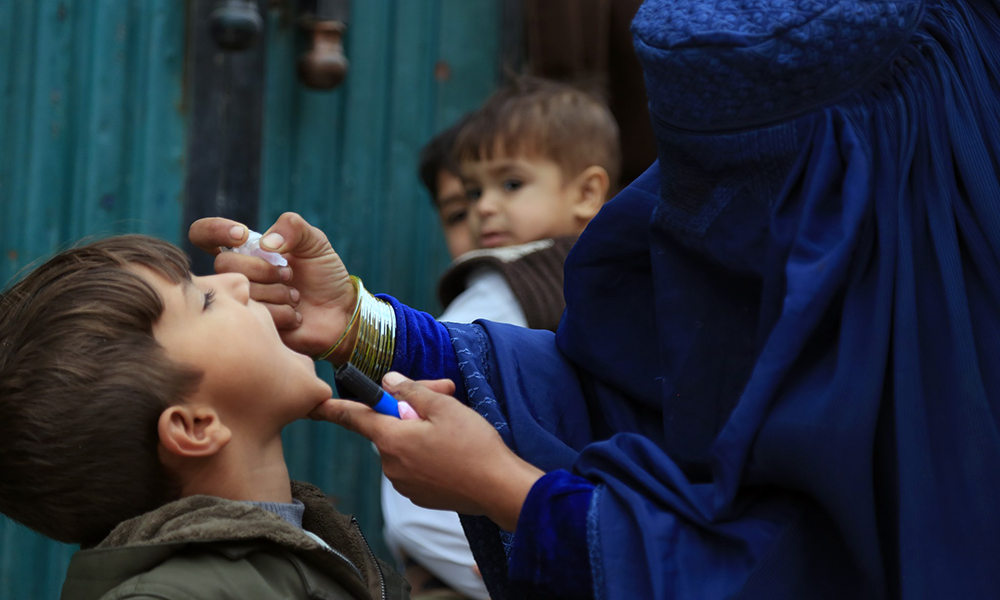Latest News
UN urges Islamic countries to send clerics to Kandahar for talks on girls’ education

The UN special envoy for global education on Tuesday urged major Muslim countries to send a delegation of clerics to Afghanistan’s southern city of Kandahar, the home of IEA supreme leader Hibatullah Akhundzada, to make the case that bans on women’s education and employment have “no basis in the Quran or the Islamic religion”.
Gordon Brown told a virtual UN press conference on the second anniversary of the IEA takeover of Afghanistan that the International Criminal Court should prosecute IEA leaders for a crime against humanity for denying education and employment to Afghan girls and women, the Associated Press reported.
The former British prime minister said he has sent a legal opinion to ICC prosecutor Karim Khan that shows the denial of education and employment is “gender discrimination, which should count as a crime against humanity, and it should be prosecuted by the International Criminal Court.”
He said he believes “there’s a split within the regime,” with many people in the education ministry and around the government in the capital, Kabul, who want to see the rights of girls to education restored. “And I believe that the clerics in Kandahar have stood firmly against that, and indeed continue to issue instructions.”
AP reported that the IEA’s chief spokesman, Zabihullah Mujahid, brushed aside questions about restrictions on girls and women in an interview late Monday in Kabul, saying the status quo will remain. He also said the IEA viewed their rule of Afghanistan as open-ended, drawing legitimacy from Islamic law and facing no significant threat.
Brown said the IEA should be told that if girls are allowed to go to secondary school and university again, education aid to Afghanistan, which was cut after the bans were announced, will be restored.
He also called for monitoring and reporting on abuses and violations of the rights of women and girls, sanctions against those directly responsible for the bans including by the United States and United Kingdom, and the release of those imprisoned for defending women’s and girls’ rights.
He announced that the UN and other organizations will sponsor and fund internet learning for girls and support underground schools as well as education for Afghan girls forced to leave the country who need help to go to school.
“The international community must show that education can get through to the people of Afghanistan, in spite of the Afghan government’s bans,” he said.
Brown said there are a number of organizations supporting underground schools and there is a new initiative in the last few weeks to provide curriculum through mobile phones, which are popular in Afghanistan.
During the 20 years the Taliban were out of power, Brown said six million girls got an education, becoming doctors, lawyers, judges, members of parliament and cabinet ministers.
Today, he said, 2.5 million girls are being denied education, and three million more will leave primary school in the next few years, “so we’re losing the talents of a whole generation.”
Brown urged global action and pressure — not just words — to convince the IEA to restore the rights of women and girls.
“We have not done enough in the last two years,” he said. “I don’t want another year to go by when girls in Afghanistan and women there feel that they are powerless because we have not done enough to support them.”
Latest News
Norwegian Chargé d’Affaires meets with IEA deputy foreign minister
Welcoming the diplomat’s visit to Kabul, Stanikzai underscored the importance of political relations between Afghanistan and Norway, the foreign ministry said in a statement.

The Norwegian Chargé d’Affaires for Afghanistan, Per Albert Ilsaas, on Saturday met with IEA’s Deputy Foreign Minister for Political Affairs, Sher Muhammad Abbas Stanikzai, in Kabul.
Welcoming the diplomat’s visit to Kabul, Stanikzai underscored the importance of political relations between Afghanistan and Norway, the foreign ministry said in a statement.
In addition to focusing on bilateral political, humanitarian, and other pertinent issues, the two sides expressed hope that continued engagement would lead to constructive solutions to related issues.
This comes two weeks after the Foreign Ministry Spokesman Abdul Qahar Balkhi expressed disappointment regarding the decision by the Norwegian government to downgrade diplomatic relations with Afghanistan.
Balkhi said in a post on X that such decisions should not be linked with internal affairs of other countries.
“Diplomatic engagement is most effective when it fosters mutual understanding and respect, even amidst differing viewpoints,” he stated.
“Access to consular services is a fundamental right of all nationals. We strongly urge all parties to prioritize this principle in the spirit of international cooperation,” he added.
Latest News
A new polio vaccination campaign is set to launch in Afghanistan
Afghanistan and Pakistan are the only two countries in the world where polio has not been eradicated.

The “Afghanistan Polio-Free” organization announced that a new round of polio vaccinations will begin on Monday, December 23, in various provinces of Afghanistan.
The organization did not specify which provinces will be targeted or how long the vaccination campaign will last.
Afghanistan and Pakistan are the only two countries in the world where polio has not been eradicated.
On December 4, 2023, the World Health Organization (WHO) issued a statement reporting a 283% increase in polio cases in Afghanistan. According to the WHO, the number of positive environmental samples for wild poliovirus type 1 in Afghanistan in 2024 reached 84, compared to 62 cases in 2023.
The Ministry of Public Health claimed in November 2024 that no new cases of polio had been reported in Afghanistan for the year.
Latest News
G7 envoys urge national dialogue for lasting stability in Afghanistan

Special Representatives of the Group of Seven (G7), including the European Union, have emphasized the importance of a national dialogue for achieving long-term stability in Afghanistan.
Following a meeting on Afghanistan in Geneva, Switzerland, G7 special envoys issued a joint statement calling for the restoration of women's rights and urging the Islamic Emirate to fight terrorism.
The statement reads: "Achieving sustainable peace and stability requires credible governance that represents all segments of Afghan society."
The representatives also expressed concern over the IEA’s decision to ban girls from attending medical institutes, warning that it will have devastating consequences for the citizens, particularly mothers and their infants.
The statement described this ban as unacceptable and called on the Afghan authorities to lift it immediately.
Earlier, countries and international organizations had called for the removal of restrictions on the education and employment of women and girls, emphasizing the need for a national dialogue.
In response to these concerns, IEA has repeatedly stated that it will not allow interference in the internal affairs of the country.
The G7 special envoys also expressed their concern about the recent terrorist attacks in Kabul and the surrounding region, warning that terrorism remains a serious threat to Afghanistan's security. They confirmed the actions of the IEA against Daesh but stressed the need for more decisive measures.
-

 Latest News5 days ago
Latest News5 days agoIndia hoping to import coal and marble from Afghanistan
-

 Sport4 days ago
Sport4 days agoZimbabwe’s opening ODI against Afghanistan abandoned
-

 Latest News5 days ago
Latest News5 days agoJapan announces $27.5 million aid package to Afghanistan
-

 Latest News1 day ago
Latest News1 day agoAfghan men must stand with women to support viable future of country: US envoy
-

 World3 days ago
World3 days agoNorth Korean troops suffer 100 deaths, struggling in drone warfare, South Korea says
-

 Latest News3 days ago
Latest News3 days agoTwo horror accidents on Kabul-Kandahar highway leave 52 dead
-

 International Sports4 days ago
International Sports4 days agoLanka T10: Kandy Bolts in at 4th spot in playoffs after thrilling day
-

 Sport3 days ago
Sport3 days agoAfghanistan crush Zimbabwe by 232 runs in second ODI
























